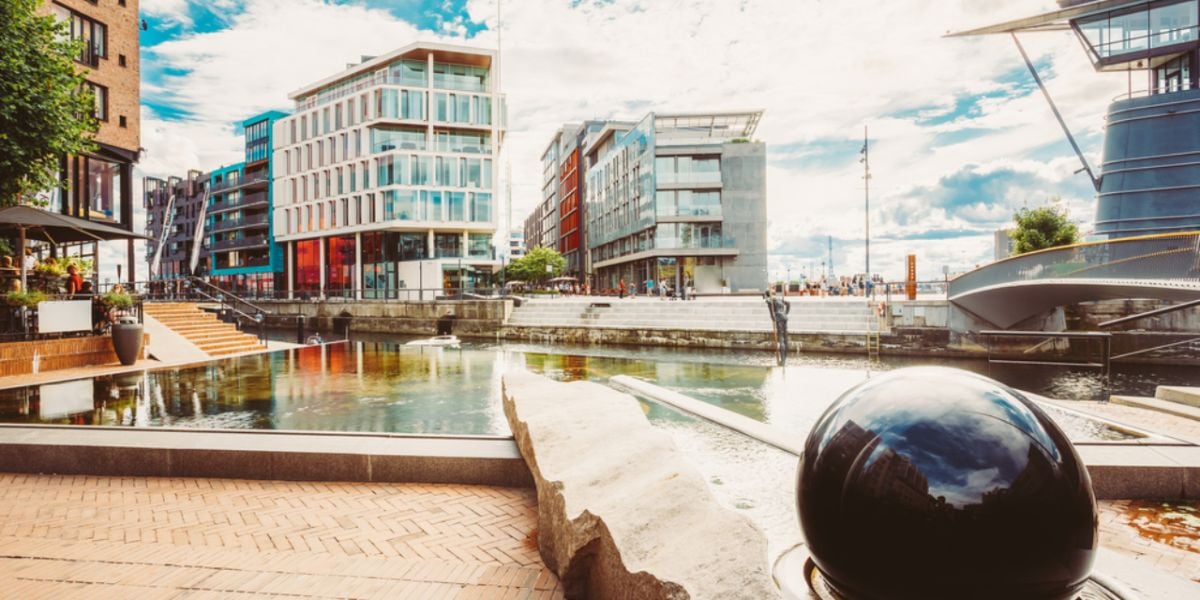
Oslo, the dynamic Norwegian capital, is increasingly attracting expatriates looking to settle in the city long-term. What makes this city so appealing? Its exceptional quality of life and flourishing economy. Purchasing real estate in Oslo is not only an exciting prospect but also a potentially lucrative investment. However, it's essential to understand the nuances of the local market, the buying process, and the available financing options. This guide provides all the necessary information to help you successfully navigate the real estate landscape in Norway's metropolis.
Overview of the real estate market in Oslo
Real estate price trends
In recent years, Oslo's real estate market has seen steady price increases driven by high demand and limited supply. According to Eiendom Norge statistics, housing prices in the capital rose by 6% in 2024, outpacing the national average. This upward trend is fueled by urbanization, economic growth, and the city's growing appeal.
Forecast for 2025
According to experts, real estate prices in Oslo stay on the rise, and further increases are predicted in 2025, though at a slower pace. Higher interest rates and global economic conditions may temper the growth slightly, presenting potential opportunities for expectant investors. It's critical to closely monitor market trends and regularly review market data and reports from Statistisk sentralbyrå (SSB).
Why buy property in Oslo?
Economic stability
Norway boasts a stable economy, bolstered by key industries like oil, gas, technology, and services. This economic resilience is mirrored in Oslo's real estate market, providing security for investors looking for stability.
Quality of life
The supreme quality of life is the hallmark of the city of Oslo, which stands out as a metropolis blending modern infrastructure, abundant green spaces, and stellar public services. The city allows residents to ski in winter, sail throughout the year, and regularly attend opera and theater performances, all while being surrounded by vast forests just a metro ride away.
This unspoiled balance of urban life and proximity to nature in the Viking city is particularly attractive to expatriates, especially families. Additionally, Norway is renowned for its safety, with Oslo being no exception. The city's official website provides useful information about property purchases and is a great place to start.
Oslo's rental market potential
With a steadily growing population and significant demand for housing, particularly in central areas, investing in rental properties in Oslo can provide strong returns. Neighborhoods like Grünerløkka, Frogner, and Majorstuen are in high demand from tenants.
Types of properties available in Oslo
Freehold property (Eier/Selveier)
With this type of property, the buyer owns both the entire property and the associated land, offering great flexibility in terms of modifications and usage. However, acquisition fees include a 2.5% purchase tax ("dokumentavgift").
Cooperative property (Andel)
In a cooperative property, the buyer acquires a share in a cooperative that owns the building. While the purchase fees are typically lower, higher monthly charges may apply. This type of property is common in larger Norwegian cities.
Shareholding property (Aksjeleilighet)
In this arrangement, the buyer becomes a shareholder in a real estate company that owns the property. While less common, this option may offer tax benefits and lower acquisition costs.
Things to consider when buying property in Oslo
Financial preparation
First and foremost, evaluate your borrowing capacity, especially if you require financing. This is the starting point for any property search and will be real estate agents' opening question. Norwegian banks provide online calculators to help estimate how much you can borrow. An appointment can also be scheduled either online or by phone to have a simulation done with a consultant. It's essential to get a loan pre-approval ("finansieringsbevis") before making an offer on a property.
Property search
The main platform for searching real estate listings in Norway is Finn.no, which aggregates most available property listings and offers advanced filters to narrow your search. Local real estate agencies like PrivatMegleren and EiendomsMegler1 are also worth checking.
For added security in your individual research, look for a "tilstandsrapport" or "salgsoppgave"—a detailed property report that outlines the condition of the property and other key details; though not mandatory, it's highly recommended.
Viewings and auctions
In Oslo, even more than in Norway globally due to very high demand, properties are sold via auctions. After attending a viewing, interested buyers submit offers through an electronic auction system. It's crucial to set a maximum bid in advance to avoid exceeding your budget. Bids are placed via text message on auction day, where offers are submitted until a winner is determined. We cannot emphasize this enough: the budget approved by your bank is not to be exceeded as any offer is binding and the commitment must be honored.
Signing the contract
Once your offer is accepted, a contract is signed between both parties. Typically, you'll pay a 10% deposit and settle the 2.5% "dokumentavgift." It's advisable to consult a real estate lawyer to assist you through this process.
Financing your property purchase in Oslo
Interest rates and loan conditions
Mortgage interest rates in Norway are currently around 4.3%, an increase from previous years. Buyers should plan carefully for higher monthly payments. Consider the following:
- Personal contribution: Banks usually require a down payment of at least 15% of the purchase price.
- Comparing offers: It's wise to shop around and compare offers from various banks.
- Municipal loans (Startlån): First-time buyers may qualify for favorable municipal loans through Husbanken or local municipalities.
Calculating your borrowing capacity
Your borrowing capacity depends on several factors:
- Your income;
- Your fixed monthly expenses;
- Your personal contribution.
Online simulators available on bank websites like DNB or Nordea provide a quick and realistic estimate to help you assess your financial situation.
Investing in Oslo properties: Your best options
Each neighborhood in Oslo offers unique opportunities based on your budget, lifestyle, and investment goals. Popular areas include:
Grünerløkka
- Profile: Trendy area, ideal for young professionals and creatives.
- Advantages: Cafes, independent outlts, proximity to public transport.
- Average price per m2: High, but the neighborhood offers excellent rental potential.
Frogner
- Profile: Upscale residential area favored by affluent families.
- Advantages: Proximity to the city center, large properties, access such as Vigeland.
- Average price per m2: Among Oslo's highest.
Gamle Oslo
- Profile: A developing area offering good value for money.
- Advantages: Ideal for investors seeking medium-term capital gains.
- Average price per m2: More affordable than the city center.
Ensjø and Løren
- Profile: Up-and-coming residential neighborhoods on the outskirts.
- Advantages: Recent construction works, modern infrastructures.
- Average price per m2: Quite affordable, with good potential for appreciation.
Majorstuen
- Profile: A central and cosmopolitan area with a vibrant shopping and cultural scene.
- Advantages: Excellent access to public transport, first-rate rental potential.
- Average price per m2: High.
Real estate purchasing process in Norway
Open viewings (Visning)
In Norway, property viewings are typically open to the public, so you may not be the only one attending. The high demand for some of Oslo's properties means crowded viewing slots.
To make the most of this time, prepare your practical questions about costs and restrictions. Be sure to inspect the property thoroughly for potential work, paying attention to details like lighting, noise levels, public transport accessibility, and local amenities (e.g., supermarkets and schools).
A private viewing (visning) can also be requested, typically during a second visit. However, the Oslo real estate market is highly competitive, and properties tend to sell quickly. All the more reason to clearly define your housing criteria beforehand.
Viewings are announced on platforms like Finn.no, which is widely used and highly user-friendly. These events provide an excellent opportunity to explore properties in person and ask any questions directly to the real estate agent.
Auction system
In contrast to many other countries, Norway uses an auction system for property purchases. This can be confusing at first, but the process is always the same:
- Auctions begin after viewings are concluded. Interested buyers should react quickly and submit electronic bids.
- Bids must always be higher than the previous one, and the seller can accept or reject offers at any time.
Good to know:
Set a maximum budget to avoid impulsive bidding.
Signing the contract
Once the auction is finalized, both parties sign a sales contract, with the buyer paying a 10% deposit and agreeing to complete the transaction within a designated period.
Additional costs when buying property in Oslo
Property purchase in Norway is not just about the property price. Here are the main additional costs to consider:
Tax registration (Dokumentavgift): 2.5% of the purchase price for freehold properties.
Notary fees: These are typically included in the real estate agent's fees.
Co-ownership fees: Monthly fees for the maintenance of common areas if you buy a property in a co-op.
Renovation: Some properties, especially in older neighborhoods, may require renovation.
Investing in rental property in Oslo
With increasing demand for rental properties, Oslo presents an attractive market for rental real estate investors. Here's what to know:
- Tenant profile: Primarily students, expatriates, and young professionals.
- Rental yield: Central neighborhoods like Grünerløkka and Majorstuen offer stable rental returns in case you depend on this rental income for your livelihood and prefer not to wait for the property to increase in value.
- Regulations: Ensure compliance with local lease laws and tax obligations.
Local rules on leases and tax declarations in Oslo
Residential lease regulations and rental property tax obligations in Norway are governed by national laws and uniformly applied across the country, including Oslo. Key regulations include:
Residential lease regulations
- Housing lease law (Husleieloven): Governs the rights and duties of tenants and landlords. It encompasses various aspects such as lease duration, rent amounts, rent adjustments, security deposits, and termination terms. For example, rent adjustments must comply with the consumer price index and can only be made once per year.
- Rental contracts: Must be written and contain essential details such as tenant and landlord information, property description, rent amount, lease term, and termination conditions. The Norwegian Consumer Council (Forbrukerrådet) provides a standard rental contract template commonly used nationwide.
Tax obligations on rental income
- Rental income declaration: Income derived from renting properties must be reported to the Norwegian Tax Administration (Skatteetaten). These earnings are taxable, and property owners can deduct specific rental-related expenses, such as maintenance costs and mortgage interest.
- Property tax (Eiendomsskatt): Some municipalities, including Oslo, levy a property tax on real estate with varying rates and conditions.
- Value Added Tax (VAT): Rental income from residential properties is typically exempt from VAT. However, the rental of commercial properties may be subject to VAT.
We recommend consulting the official website of the Norwegian Tax Administration or reviewing the Housing Lease Act for detailed and current information on lease regulations and tax obligations in Norway. You may also want to seek advice from a local legal or tax expert for guidance and assistance in navigating the Norwegian legal system effectively.
We do our best to provide accurate and up to date information. However, if you have noticed any inaccuracies in this article, please let us know in the comments section below.








